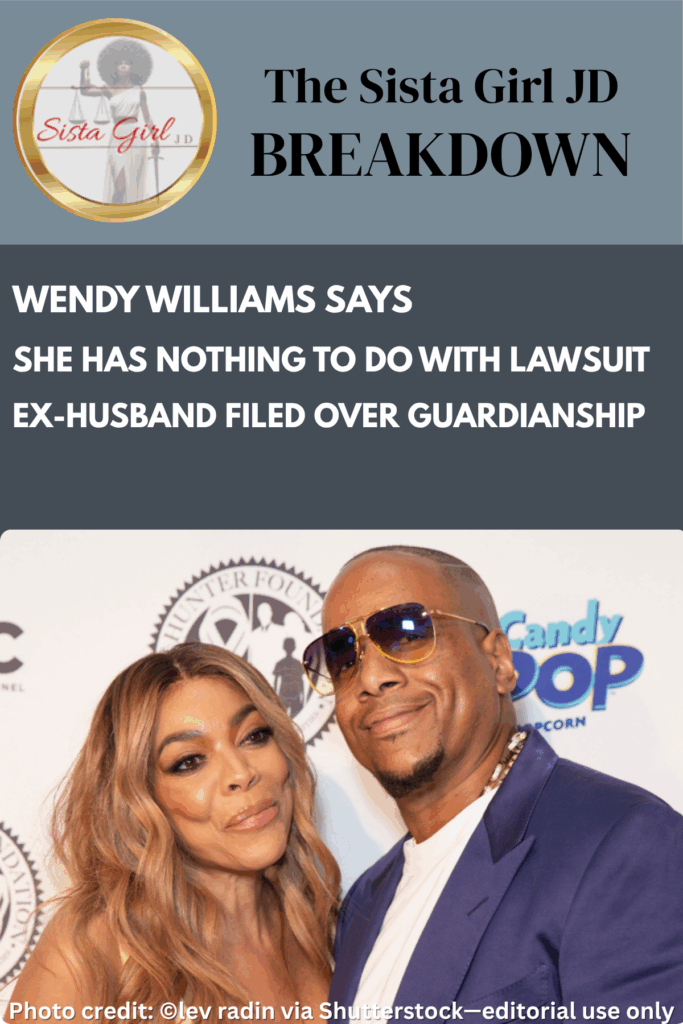Wendy Williams Disavows $250 Million Lawsuit Filed by Her Ex
By SistaGirl JD | June 20, 2025
Guardianship cases can stir major legal and ethical concerns.
Wendy Williams is making it crystal clear: she had nothing to do with the explosive $250 million federal lawsuit her ex-husband filed in her name this week.
Guardianship is meant to protect vulnerable people—but as this case shows, it can also raise serious questions about control, consent, and misuse.
According to a report from PEOPLE Magazine (June 19, 2025), Hunter filed suit in New York on Wendy’s behalf. He named her court-appointed guardian, Judge Lisa Sokoloff, Wells Fargo, the Presley Austin assisted-living facility, and several others. The filing claims Wendy has been overmedicated, unlawfully confined, and stripped of her legal autonomy under guardianship.
Hunter, who says he’s acting as a “next friend,” also alleges that Wendy’s “beloved rescue cats” were sold without her consent, and that she has suffered “emotional and physical distress” under the current legal arrangement. Among other remedies, he’s asking the court for Wendy’s immediate release from the facility, a new guardian, the unsealing of prior guardianship records, a forensic audit, and a jaw-dropping $250 million in damages.
Still, Wendy says she never asked for any of it.
Wendy’s attorney, Joe Tacopina, made it clear to PEOPLE that she never authorized the lawsuit. He emphasized that “Mr. Hunter has no standing” and called the move a blatant “money grab.”
According to her team, Wendy didn’t know anything about the filing until it went public. Instead, she’s continuing to focus on her health.
You can find more insights like this on The Breakdown — where we unpack the headlines and spotlight the stories behind the law.
Let’s Talk About It
Legal Lens by SistaGirl JD: When Guardianship Meets Public Scandal
This case raises serious questions—both legal and ethical. Guardianship is designed to protect vulnerable people—not silence them. Yet, the legal concept of a “next friend”—(someone who files on behalf of someone deemed incapacitated) can sometimes be misused.
In many jurisdictions, courts require strong evidence that the individual filing as “next friend” has a real connection to the person, is acting in good faith, and isn’t seeking personal gain. Whether that standard is met in this case will ultimately be for the court to decide.
Still, one thing’s for sure: this case highlights how thin the line is between protection and control when it comes to elder care and guardianship law.
More on Guardianship Law in the News
Sources:
- PEOPLE Magazine, June 19, 2025
- Wendy Williams Says She Had ‘No Idea’ Ex-Husband Filed Lawsuit in Her Name
- Photo credit: © Lev Radin via Shutterstock — editorial use only
Got thoughts on guardianship laws or this case? Drop them in the comments — or check out our full legal dive on The Breakdown.
If this story hit a nerve, you’re not alone. We’re breaking down the laws that protect (and sometimes fail) our elders.
Catch more stories like this on The Breakdown
Catch More on Guardianship and Justice at Sista Girl JD

📺 Subscribe to Sista Girl JD on YouTube
📱 Follow @SistaGirlJD for legal game you can use
